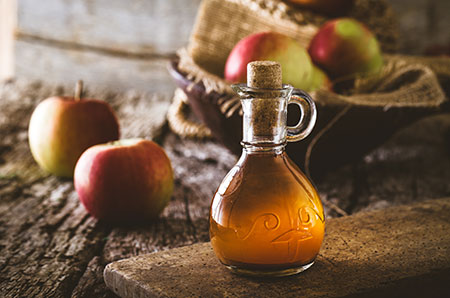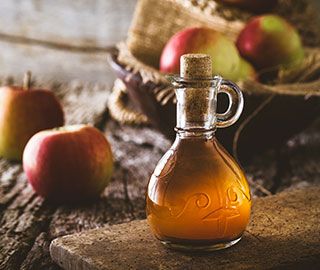Winning with Apple Cider Vinegar
Just like Intermittent Fasting, the words “Apple Cider Vinegar” seem to be buzzing around the Banting Universe.
People like Dr. Jason Fung, Kris Gunnars, and Dr. Mercola are all shouting about the benefits of this fermented apple liquid.
And recently an article was published in the UK, wanting to find out if the health claims about apple cider vinegar were true. Dr. Michael Mosley teamed up with Dr. James Brown to find out.

Vinegar was first discovered thousands of years ago when wine was left for some time, and became sour and turned into vinegar. Vinegar actually means “sour wine” in French. It was originally used for cleaning, washing wounds (due to its antimicrobial properties) and for preserving food.
Apple cidervinegar is made from fermenting apples. Firstly, the apples or apple cider is exposed to yeast, which ferments the sugars and turns it into alcohol. After a while, a culture of acetic acid bacteria grows on the surface and is called the “mother of vinegar,” which is what gives it its sharp, sour taste. Apple cider vinegar seems to be more beneficial than other vinegars because it contains acetic acid and the pectins from the apple cider, which is a type of soluble fibre. The more unprocessed, and unfiltered your apple cider vinegar is, the better it is for you. If it still contains the “mother of vinegar”, that’s even better.
What are the benefits of apple cider vinegar?
It lowers glucose levels, after a meal
Reduces the insulin response, after a meal
Increases satiety, which might make you want to eat less
Lowers morning blood sugar levels, in people with type 2 diabetes
Lowers triglyceride levels, when consumed daily, for an extended period
How should you take apple cider vinegar?
Have two teaspoons just before a meal or with your meal (i.e., with olive oil as a salad dressing)
Have two tablespoons diluted in water before bedtime
Did the tests done by Dr. Michael Mosely and Dr. James Brown confirm the benefits of apple cider vinegar?
YES
Question: Will drinking a couple of tablespoons of vinegar, diluted in water, before a meal help you control your blood sugar levels?
Answer: “It turned out that the cider vinegar, but not the malt vinegar, had a big impact, reducing the amount of sugar in the volunteers’ blood by 36% over 90 minutes.”
“This could be because the acetic acid in the cider vinegar suppresses the breakdown of starches, which means that if you consume it before a carb-rich meal, less sugar will get absorbed. We expected the malt vinegar to have a similar effect to the cider vinegar, but in our small study it didn’t.”
Question: Does apple cider vinegar lower cholesterol?
Answer: “Those consuming cider vinegar saw an average 13% reduction in total cholesterol, with a strikingly large reduction in triglycerides.”
*Please consult your doctor before making any dietary changes.
We have included apple cider vinegar in our meal plans. We have over 50 meal plans in our platform. Sign up to the Online Program and start benefitting today.


